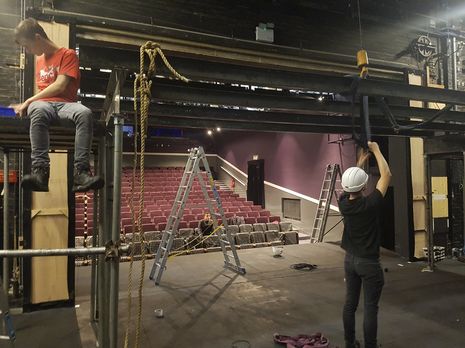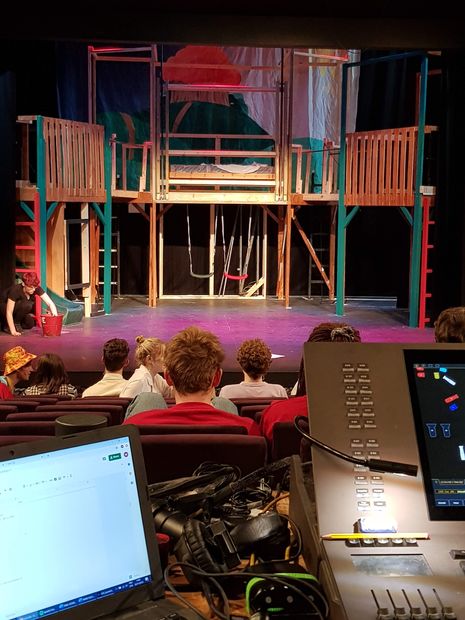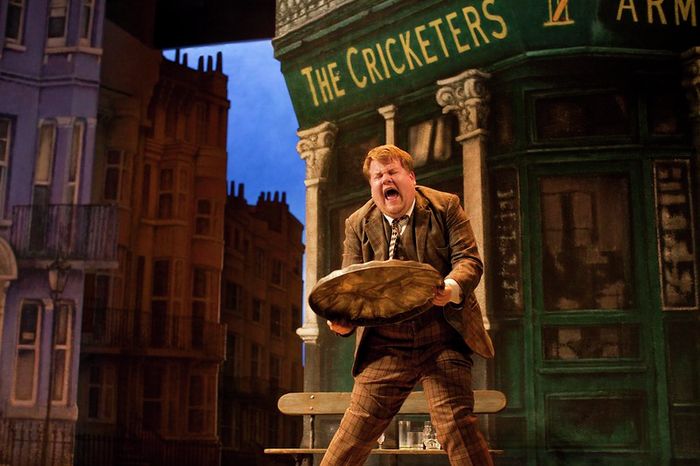Technical Directing or: How I Learned to Worry and Hate the Tech (Rehearsal)
15-time TD Zak Karimjee puts the spotlight on what it’s like to take on the role, and takes us through the lead up to a show

The ADC Theatre is an amazing, unbelievable place. The opportunities for amateur technicians are far beyond what's available in the "real world" - there's a proper fly tower, tons of lights, a full blown workshop, abundant roles available, and funding that allows you to take advantage of it all. This leads to ambitious designs, crazy ideas and feats of time management that wouldn't be out of place in the Prisoner of Azkaban.
As a Technical Director, your unenviable task is to execute your set designer's vision. You generally have a week of workshop time, followed by (theoretically) 24 hours or so of stage time to go from paper to a safe, attractive and sturdy set that won't fall over when theatre management kicks it. I'm going to try and bring you along for the ride on this journey into hell and back again, and then maybe convince you that it was worth doing.
“The lack of doing feels odd, but you realise it's quite draining giving orders”
The planning process is often the fun, carefree part, but you'll look back on it with regret. You were probably a bit too lenient with your set designer or director, and now you've got to source a tiny car to drive around stage (looking at you, Oliver Jones) or do something absurd like put a revolve back together (still looking at you Ollie). There'll be the frustrating, pointlessly long phone calls to the timber merchant who still don't have online ordering. You'll have to do some redesigning after you see the risk assessment and realise you can't have 6 foot drops without a barrier. And you'll make the mistake of asking a room full of techies for help with a problem - they will pick apart your entire plan and destroy your confidence in an attempt to be 'helpful'.
After a week battling with bendy wood, some close calls with power tools and inevitably running out of screws, you've probably got most of the set in the state it needs to be for the get-in. Hopefully you've remembered that it all needs to fit through a lot of doors. A pleading email to the techies list, a rushed trip to Sainsbury's to buy get-in breakfast and a late night in the theatre zoom by, and you've arrived at Saturday night. You sleep poorly as your mind combs over every inch of your plan, and that 8am start at the ADC arrives much sooner than you want it to.
“Seeing a set you built become part of a show is an unbeatable experience”
The get-in is a strange beast. You've spent all this time planning and now, suddenly, you've got to execute in a rapidly decreasing number of hours. You also have a group of people standing around (begrudgingly) awaiting your orders, which is probably a level of power and responsibility you're not accustomed to. Every get in is different, depending on your show, but in my experience they go something like this:
You start off with the grid shift - that is, moving all the stuff around that flies. There's probably a light in the way of a set piece, and if you've cut things a bit fine, a set piece in the way of a set piece. You get through this with a lot of shouting and pat yourself on the back for being 'on track'.
After a foolishly relaxed lunch break you get on with the task of the set. This is where you start standing around giving orders to your dwindling volunteer group, and those uncharacteristically helpful actors who you love. The lack of doing feels odd, but you realise it's quite draining giving orders. As the day goes by you get more and more sick of figuring out what to do, and by the end of Sunday you're pretty knackered. You eventually decide to wrap up (or are forced to by a concerned friend) and go home. You've definitely not finished everything.

The next day you come in as early as you can bear to and work on finishing stuff off. This really drags, and you've got the tech rehearsal rapidly approaching. You can feel the stage manager twitching. You probably have to tell them they need to delay an hour or two while the theatre management is wandering around kicking things and telling you none of it is safe.
Finally after an indeterminate amount of time you realise you're done. You hand over control to the stage manager and sit down to relax while they start the tech rehearsal. It's strangely hard to leave the theatre - you feel an odd attachment to your creation. You'll probably have to go in and touch things up before opening night, then all of a sudden your work is done. Your last act as TD is at the get-out, where you get to wreak (safe and tidy) destruction upon your hard work in the early hours of Sunday morning, ready for some other poor sod to start the process all over again.
Technical directing is an odd experience, lending itself to sleep deprivation and stress dreams but also an amazing sense of satisfaction. Seeing a set you built become part of a show is an unbeatable experience, and is what draws me back to it again and again. Of course, none of it is possible without the help of the wonderful community which is now full of friends who were kind enough to lend me a hand on a slow Sunday evening.
 News / Eight Cambridge researchers awarded €17m in ERC research grants27 December 2025
News / Eight Cambridge researchers awarded €17m in ERC research grants27 December 2025 News / News in Brief: carols, card games, and canine calamities28 December 2025
News / News in Brief: carols, card games, and canine calamities28 December 2025 News / Caius mourns its tree-mendous loss23 December 2025
News / Caius mourns its tree-mendous loss23 December 2025 News / Clare Hall spent over £500k opposing busway 24 December 2025
News / Clare Hall spent over £500k opposing busway 24 December 2025 Interviews / Meet Juan Michel, Cambridge’s multilingual musician29 December 2025
Interviews / Meet Juan Michel, Cambridge’s multilingual musician29 December 2025









